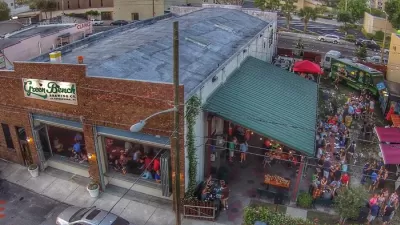In this article from Metropolis, dystopian author and urban critic James Howard Kunstler riffs on localism.
"At the moment, the ideas bundled under the rubric of "localism" are regarded as a lifestyle choice, which is to say a fashion statement of environmental concern, practiced by those with the time and means to follow fashions. 'Locavores'-who make a point to eat locally-are represented overwhelmingly by college-educated, high-income baby boomers who buy those $6 pint baskets of boutique blue potatoes at the farmers' market as much to make a statement of principle (and derive moral comfort from doing so) as to eat nutritionally sound, good-tasting food. Meanwhile, the rest of America keeps driving to the ShopRite for tubes of frozen ground round, jugs of Pepsi, and bags of Cheez Doodles made (grown?) God knows where. So the stylishly fit locavores end up looking like stuck-up moralistic snobs while the majority follows the mindless corporate programming du jour like the overstuffed lumbering TV zombies they have become. By the way, locavores also overwhelmingly drive to the farmers' market (as I have observed in my town), usually in motor vehicles the size of medieval war wagons."
Localism in this sense is very much related to the current craze for styling one's endeavors as "green." Thomas Friedman cheerleads for "green" globalism in his New York Times column while Time magazine runs "GreenCast" programs on its Web site, and all kinds of specialists design green cars, green lightbulbs, green toilets, green campuses, and green corporate headquarters (all the better for hawking those Cheez Doodles). Much of this activity can be described, to borrow a locution from public relations, as blowing green smoke up our own collective ass. Such, alas, is the sorry state of our culture nowadays that just pretending to mean well, for most people and institutions, is good enough."
"A reality-based view of all this suggests that localism and green economic practices will be taken up more broadly and earnestly only when we don't have a choice about it and can no longer manage our bad old ways. My serene personal conviction is that we are much closer to reaching that point than most Americans realize. The romance of climate change currently holds the nation's attention because it's more like a made-for-Hollywood horror-movie plot. Plus, there are a lot of secret side benefits. Will Connecticut become more like South Carolina? Surely some of the denizens of Fairfield County, Connecticut, wouldn't think that was such a bad deal. Will the grain belt move 800 miles farther north, into Canada? Very well then; Canada's our bitch anyway. Will there be more tornadoes in Nebraska? Who cares-God made the place only so movies could be shown on airplanes."
Thanks to Jon Cecil, AICP
FULL STORY: Going Local: When oil becomes scarce, our current way of life will become obsolete

Alabama: Trump Terminates Settlements for Black Communities Harmed By Raw Sewage
Trump deemed the landmark civil rights agreement “illegal DEI and environmental justice policy.”

Study: Maui’s Plan to Convert Vacation Rentals to Long-Term Housing Could Cause Nearly $1 Billion Economic Loss
The plan would reduce visitor accommodation by 25% resulting in 1,900 jobs lost.

Planetizen Federal Action Tracker
A weekly monitor of how Trump’s orders and actions are impacting planners and planning in America.

Parklet Symposium Highlights the Success of Shared Spaces
Parklets got a boost during the Covid-19 pandemic, when the concept was translated to outdoor dining programs that offered restaurants a lifeline during the shutdown.

Federal Homelessness Agency Places Entire Staff on Leave
The U.S. Interagency Council on Homelessness is the only federal agency dedicated to preventing and ending homelessness.

Restoring Northern India’s Himalayan ‘Water Temples’
Thousands of centuries-old buildings protect the region’s natural springs and serve as community wells and gathering places.
Urban Design for Planners 1: Software Tools
This six-course series explores essential urban design concepts using open source software and equips planners with the tools they need to participate fully in the urban design process.
Planning for Universal Design
Learn the tools for implementing Universal Design in planning regulations.
Caltrans
Smith Gee Studio
Institute for Housing and Urban Development Studies (IHS)
City of Grandview
Harvard GSD Executive Education
Toledo-Lucas County Plan Commissions
Salt Lake City
NYU Wagner Graduate School of Public Service



























